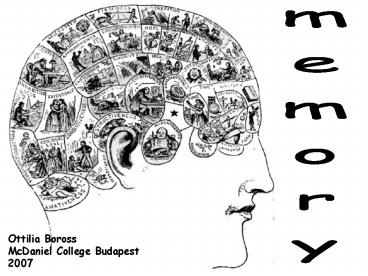memory PowerPoint PPT Presentation
1 / 28
Title: memory
1
memory
memory
Ottilia Boross McDaniel College Budapest 2007
2
Memory The capacity to retain information over
time.
- Encoding the conversion of incoming information
into a form that can be stored in memory. - Storage maintaining information in memory over
a period of time. - Retrieval the process of searching for stored
information and bringing it to mind.
3
The Atkinson-ShiffrinModel of Memory 3
memories
4
(No Transcript)
5
they differ in terms of 3 characteristics
- capacity how many units of information can be
held at one time. - duration of storage how long the information
can be held. - reason for forgetting storage failure versus
retrieval failure.
6
Sensory MemoryTemporary storage of information
7
- SM
- Capacity large contains most details of
sensory input. - Duration of Storage visual 1/10 second
auditory 2 seconds. - Reason for forgetting storage failure (e.g.,
decay).
8
Short-Term MemoryBrief storage of information
currently being used
- stores material needed
- for short periods
- serves as a workspace for
- mental computations (3 x 42 )
- way-station to long-term memory
- marijuana impairs STM
9
STM
- Capacity 7 units, - 2
- Duration of Storage less than 30 seconds
without rehearsal - Reason for forgetting storage failure (e.g.,
decay with time, displacement) - Chunking (forming units) 354-876
- 9-354-876 ------ 935-4876
10
Long-Term MemoryRelatively permanent storage of
information
- Capacity virtually unlimited. It contains 2
general kinds of information - Duration of Storage
- relatively permanent, up to a lifetime
- Reason for forgetting rather access, than
possession (retrieval failure)
11
- Encoding in long-term memory
- based on MEANING (lemon or lime?)
- we dont remember the sensory details
- enhance encoding by elaborating, making
meaningful associations (language learning)
12
- Storage in long-term memory
- enormous capacity
- consolidation needed
- (REM-sleep hippocampus)
- Alzheimers disease
- Korsakoffs disease
- Anterograde and retrograde amnesia
13
- Retrieval in long-term memory
- Do we loose the info, or access to the info?
- In many cases we loose access.
- tip of the tongue
- phenomenon
14
- Retrieval cues help us access memories - more
retrieval cues, better memory access (multiple
choice test) - Interference impairs retrieval (associating
different items with the same cue table c???
tisch asztal). - Retroactive interference new info interferes
with retrieving old info (Rowan Atkinson) - Proactive old info interferes with retrieving
new info (new pin-code)
15
- Interactions between
- encoding and retrieval
- Organization the more we organize the material,
the easier it is to retrieve. - Use of imagery method of loci, key word method
- Context, emotions easier to retrieve info when
the context and/or the individuals mood is
similar during encoding and retrieval (affective
values associate with the material)
16
Basic Reasons for Forgetting
- Encoding Failure information did not get into
memory - Storage Failure information has disappeared
from memory it is no longer in storage - Retrieval Failure information is stored in
memory but it cannot be located.
17
(No Transcript)
18
Two Major Theories of Forgetting
- Decay Theory information in memory eventually
disappears if it is not used. (Use it or lose
it.) - Interference Theory Forgetting occurs because
other things we have learned somehow prevent us
from finding the information we want.
19
Emotional factors in forgetting
- we rehearse emotional material more
- flashbulb memories
- anxiety impedes retrieval
- context (emotional)
- repression of negative memories (Freud)
20
Long-Term Memory
Explicit (declarative)
Implicit (nondeclarative)
Semantic
Episodic
Procedural
Emotional
21
Explicit (declarative) memory Information you
can describe
- Episodic personally experienced events,
self-centered truths (what happened in my
graduation) - Semantic general facts,
- general truths,
- information
- (Columbus
- discovered America in 1492)
22
(No Transcript)
23
Implicit memory Information you cannot describe
- skills, habits, motor tasks
- conditioning
- nonassociative learning
- priming the activation of clusters
- of neurons (riverbank, moneybank)
- learned emotional responses
24
Constructive Memorymemory is constructed both
from - inferences - input information
- Inferences
25
- Stereotypes (set of inferences about the
personality or physical attributes of a whole
class of people). - Schemas (mental representation of a class of
people, objects, events or situations).
26
Special Types of Memories
Childhood Amnesia most people have no memories
for events that occurred before age 3
Auto biographical Memory
27
- Eidetic
- Imagery
- Photographic
- memory
28
- Flashbulb Memory
- vivid memory of specific event of very emotional
experience - lasts long time
- can seem to be amazingly accurate, (but often
isnt)

